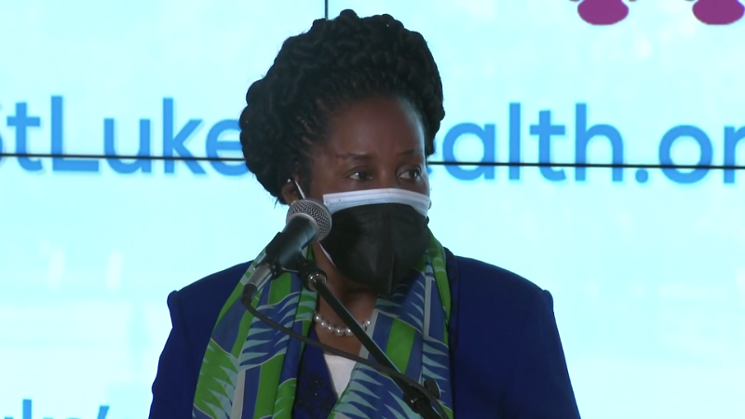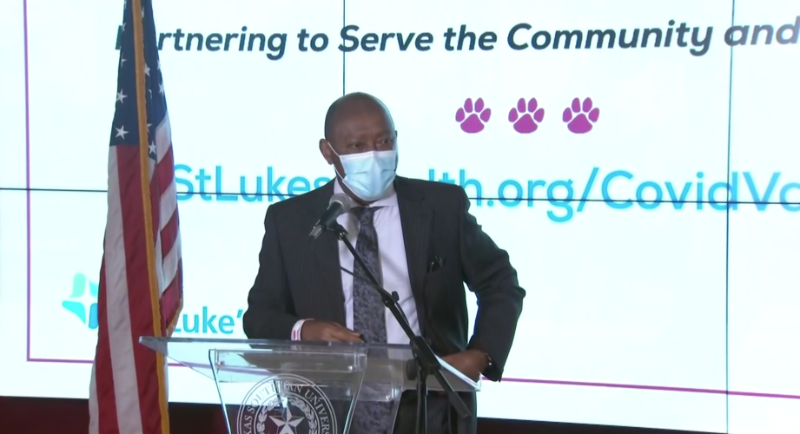Thursday’s event came after a hectic Tuesday for the new clinic, which was bombarded with eager Houstonians desperately searching for vaccine shots after Democratic State Sen. Borris Miles incorrectly tweeted out that no appointments were needed for the clinic and that there was no age requirement to get a free dose of Pfizer’s vaccine.
The real story is that the clinic is only offering vaccinations to folks who register online at stlukeshealth.org/covidvaccine. From that list of people who register, St. Luke’s and TSU say they’ll be focusing primarily on vaccinating “super seniors” who are 75 or older and Houstonians of color, two of the groups that have been hit hardest by the coronavirus and are more likely to be hospitalized or die from the disease.
In Texas, coronavirus vaccines are still limited to frontline healthcare workers, nursing home residents and staff, Texans 65 or older and those with at least one chronic health condition that makes fighting off a case of COVID-19 more difficult.
“We are honored to partner with St. Luke’s Health for the COVID-19 vaccination site here on our campus in the heart of Houston’s Third Ward,” said Interim TSU President Ken Huewitt, who hopes this new clinic will be “an access point in the city of Houston to serve the vulnerable communities we serve who meet the requirements for this vaccine.”
Turner thanked St.Luke’s “for going beyond the walls of the medical center and coming out in the community, [or] to put it in a better way, to come to the ‘hood, in the Third Ward, in the Tre, to make this vaccine available to everyone.”
He then reiterated the message he shared last weekend with a group of local Democrats at the Settegast Community Health Clinic’s vaccination site about the need for greater racial equity in COVID-19 vaccinations, the majority of which have so far gone to non-Hispanic white folks.
“You want to make sure that as many people can get it as quickly as possible, but at the same time, you want to make sure that there is equity in getting it,” Turner said Thursday, a message that Lee echoed.

U.S. Congresswoman Sheila Jackson Lee said the relatively low number of minorities who have been vaccinated is a crisis that must be addressed.
Screenshot
Turner shared the ethnic breakdown of the vaccinations that have taken place within the city of Houston so far: “43 percent Anglo, 21 percent Hispanic, roughly 8 or 9 percent Asian [and] 18 percent African American.”
“The gap is still too much,” he said.
For the past few weeks, the Houston Health Department has allocated its new vaccine doses to community health clinics that typically serve minorities, and to inoculations for elderly Houstonians who had previously called to sign up for the Area Agency on Aging’s vaccine waitlist. It’s a shift in policy from the early days of the local vaccine rollout, which were marred by a chaotic first-come, first-served online signup process that saw thousands of appointments get filled in mere minutes, leaving thousands of local residents frustrated and less tech-savvy Houstonians out in the cold.
Turner said he believes the increasing number of clinics like TSU’s within local communities of color will help Houston get on track toward achieving racial equity in local vaccinations. That effort will also be aided once the new vaccine super site run by the Federal Emergency Response Agency gets up and running at NRG Stadium later this month, he said.
The plan is for the FEMA clinic to give out 6,000 vaccine shots a day, seven days a week for at least eight weeks straight, Turner said.
Lee explained that those doses will be coming from FEMA’s own vaccine allotment and that the new NRG clinic won’t affect the vaccine supply being sent to other local providers like the Houston Health Department and Harris County Public Health.
She also challenged other local hospital systems to follow the lead of St. Luke’s and make more of a concerted effort to help get shots in the arms of Houstonians of color specifically.
“I would encourage St. Luke’s to not only be a collaborator and a partner — I would encourage you to be a messenger,” Lee said, “because you are an anchor in the Texas Medical Center… Can you imagine, if the other facilities collaborated with those of us who have been on the battlefield for so long, what an amazing spread we could determine and provide these kinds of satellite sites all over the county and the city?”


